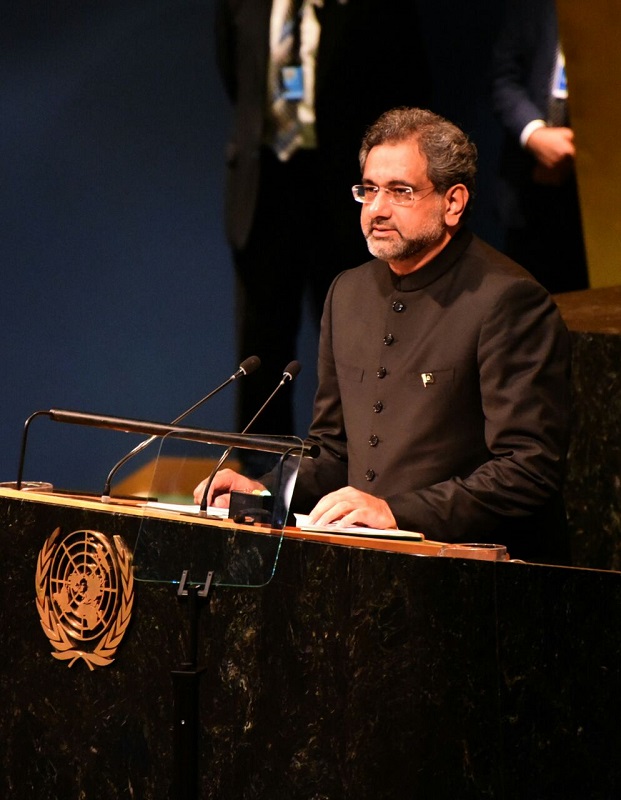MONITORING DESK: Prime Minister Shahid Khaqan Abbasi addressed the general debate of the 72nd Session of the UN General Assembly at UN Headquarters in New York on September 21 in which he raised Kashmir issue, and said that the legitimate struggle for self-determination of the people of Jammu and Kashmir continues to be brutally suppressed by Indian occupation forces.
Important points of his speech at UN General Assembly are here under:
Renewed East-West tensions may engulf Europe in another Cold War. Peace and prosperity in Asia is threatened by emerging big power friction and rising tensions in South, East and West Asia.
The Middle East is wracked by war and violence – in Syria, Iraq, Yemen and elsewhere. Although Daesh appears to have been weakened in Iraq and Syria, terrorist violence has spread and intensified across the Middle East and Africa and other parts of the world.
Israeli prolonged occupation and expansion of illegal settlements in Palestine may lead to renewed and wider violence in Middle East.
Rising racism and religious hatred – manifested in xenophobia and Islamophobia – is erecting physical walls and psychological barriers between nations and peoples
The ethnic cleansing of Rohingyas is not just an affront to all norms of humanity but also challenges our collective conscience.
Pakistan welcomes the efforts launched by Secretary General Antonio Guterres to revitalize the United Nations’ capabilities in Peace and Security, Development and Management.
India refuses to implement the unanimous resolutions of the UN Security Council, which mandate a UN supervised plebiscite to enable the people of Jammu and Kashmir to freely decide their destiny.
India has deployed nearly 700,000 troops in Occupied Kashmir to suppress the legitimate struggle of the Kashmiris to exercise their right to self-determination. This is the most intense foreign military occupation in recent history.
India has responded with massive and indiscriminate force to suppress the Kashmiris, shooting indiscriminately at children, women and youth. Hundreds of innocent Kashmiris have been killed or injured. Shotgun pellets have blinded and maimed thousands of Kashmiris including children. These and other brutalities clearly constitute war crimes and violate the Geneva Conventions.
Pakistan demands an international investigation into India’s crimes in Occupied Kashmir. We ask that the United Nations Secretary-General and the High Commissioner for Human Rights send an inquiry Commission to Occupied Kashmir to verify the nature and extent of India’s human rights violations, secure the punishment of those responsible, and provide justice and relief to the victims.
Pakistan also urges the international community to call on India to: halt pellet gun attacks and other violence against unarmed demonstrators; stop the use of rape as an instrument of state policy; end media blackouts; rescind its draconian emergency laws; and free all Kashmiri political leaders.
To divert the world’s attention from its brutalities, India frequently violates the ceasefire along the Line of Control in Kashmir. Despite over 600 violations since January this year Pakistan has acted with restraint. But if India does venture across the LoC, or acts upon its doctrine of “limited” war against Pakistan, it will evoke a strong and matching response.
The Kashmir dispute should be resolved justly, peacefully and expeditiously. As India is unwilling to resume the peace process with Pakistan, we call on the Security Council to fulfill its obligation to secure the implementation of its own resolutions on Jammu and Kashmir.
To this end, the UN Secretary-General should appoint a Special Envoy on Jammu and Kashmir. His mandate should flow from the longstanding but unimplemented resolutions of the Security Council.
It is clear that peace will not be restored by the continuing resort to military force in Afghanistan. Neither Kabul and the Coalition, nor the Afghan Taliban, can impose a military solution on each other.
What Pakistan is not prepared to do is to fight the Afghan war on Pakistan’s soil.
Pakistan can not endorse any failed strategy that will prolong and intensify the suffering of the people of Afghanistan and Pakistan and other regional countries.
Pakistan believes that the urgent and realistic goals in Afghanistan should be: One, concerted action to eliminate the presence in Afghanistan of Daesh, Al-Qaeda and their affiliates, including the TTP and Jamaat-ul-Ahrar, which was recently declared a terrorist organization by the Security Council.
Negotiations between Kabul and the Afghan Taliban are needed to end the war in Afghanistan.
Pakistan fought the war against terror with its own resources. Pakistan’s economic losses are estimated at over $120 billion. Yet, we remain committed to fully implementing our National Action Plan against terrorism and extremism. Defeating terrorist violence is vital to realize our overriding priority of rapid economic and social development.
Pakistan’s integration into the Eurasian Belt and Road network will provide a firm foundation for Pakistan’s rapid economic development.





